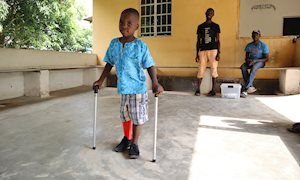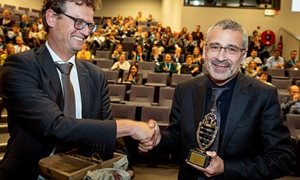 Another publication of the successful Dutch collaborative group on pancreatitis research with substantial contribution from Radboudumc researchers, Harry van Goor and Kees van Laarhoven.
Another publication of the successful Dutch collaborative group on pancreatitis research with substantial contribution from Radboudumc researchers, Harry van Goor and Kees van Laarhoven.
Abstract
BACKGROUND & AIMS
In a 2010 randomized trial (the PANTER trial), a surgical step-up approach for infected necrotizing pancreatitis was found to reduce the composite endpoint of death or major complications compared with open necrosectomy; 35% of patients were successfully treated with simple catheter drainage only. There is concern, however, that minimally invasive treatment increases the need for reinterventions for residual peripancreatic necrotic collections and other complications during the long term. We therefore performed a long-term follow-up study.
METHODS
We reevaluated all the 73 patients (of the 88 patients randomly assigned to groups) who were still alive after the index admission, at a mean 86 months (±11 months) of follow-up. We collected data on all clinical and health care resource utilization endpoints through this follow-up period. The primary endpoint was death or major complications (the same as for the PANTER trial). We also measured exocrine insufficiency, quality of life (using the Short Form-36 and EuroQol 5 dimensions forms), and Izbicki pain scores.
RESULTS
From index admission to long-term follow-up, 19 patients (44%) died or had major complications in the step-up group compared with 33 patients (73%) in the open-necrosectomy group (P = .005). Significantly lower proportions of patients in the step-up group had incisional hernias (23% vs 53%; P = .004), pancreatic exocrine insufficiency (29% vs 56%; P = .03), or endocrine insufficiency (40% vs 64%; P = .05). There were no significant differences between groups in proportions of patients requiring additional drainage procedures (11% vs 13%; P = .99) or pancreatic surgery (11% vs 5%; P = .43), or in recurrent acute pancreatitis, chronic pancreatitis, Izbicki pain scores, or medical costs. Quality of life increased during follow-up without a significant difference between groups.
CONCLUSIONS
In an analysis of long-term outcomes of trial participants, we found the step-up approach for necrotizing pancreatitis to be superior to open necrosectomy, without increased risk of reinterventions.
Publication
Superiority of Step-up Approach vs Open Necrosectomy in Long-term Follow-up of Patients With Necrotizing Pancreatitis.
Hollemans RA, Bakker OJ, Boermeester MA, Bollen TL, Bosscha K, Bruno MJ, Buskens E, Dejong CH, van Duijvendijk P, van Eijck CH, Fockens P, van Goor H, van Grevenstein WM, van der Harst E, Heisterkamp J, Hesselink EJ, Hofker S, Houdijk AP, Karsten T, Kruyt PM, van Laarhoven CJ, Laméris JS, van Leeuwen MS, Manusama ER, Molenaar IQ, Nieuwenhuijs VB, van Ramshorst B, Roos D, Rosman C, Schaapherder AF, van der Schelling GP, Timmer R, Verdonk RC, de Wit RJ, Gooszen HG, Besselink MG, van Santvoort HC; Dutch Pancreatitis Study Group.
Harry van Goor is themeleader of theme Reconstructive and regenerative medicine.
Kees van Laarhoven is member of theme Tumors of the digestive tract.
Related news items

3D-printing prosthesis legs in the middle of the jungle a video call with our colleague Merel in Sierra Leone
14 December 2021 'They sometimes think I'm a sorceress,' says technical physician Merel van der Stelt, while she smiles. 'Take this lady without a lower leg. Yesterday she came here. We scanned her stump and today she already has a 3D printed prosthesis. With a prosthesis people count again'. go to page
Awardees RIHS Junior Researcher round 2020
23 October 2019 Recently, RIHS held an internal call for Radboudumc junior researcher (PhD) positions. This year 6 positions have been awarded. go to page
Awarded KWF grants for Radboudumc researchers
19 December 2018 The Dutch Cancer Society (KWF) has awarded 8 grants to Radboudumc researchers. We congratulate them with this funding and wish them success with their great work. go to page
Report of the 12th New Frontiers symposium Big data, better healthcare? - 1 November 2018
7 November 2018 Examples from the application of deep learning to image reading in pathology and radiology and the application of network medicine to monitor infectious disease outbreaks or collective mood states using twitter data showed the huge potential of big data approaches for building better healthcare. go to page

